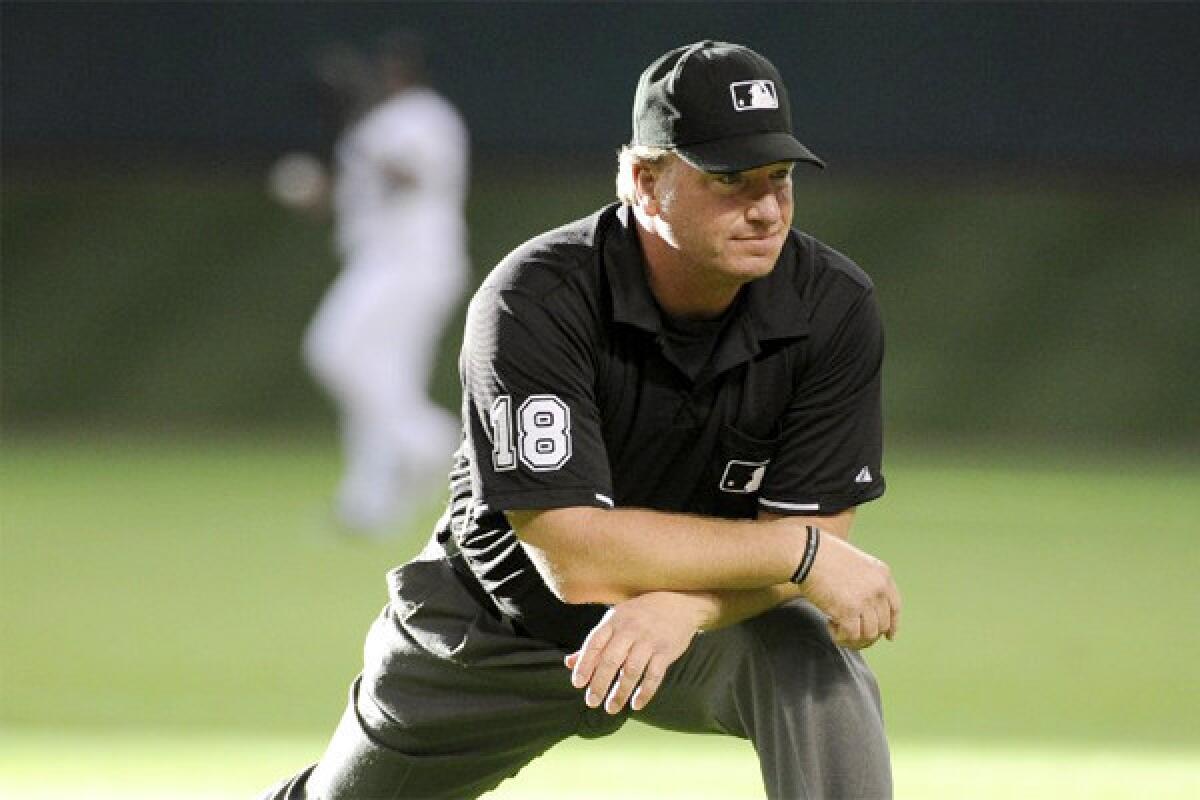Sports officials aren’t immune from drug testing

- Share via
Major League Baseball’s decision to terminate a veteran umpire last month after a reported positive drug test stirs questions about the consequences of sports’ arbiters slipping to possible outcome-altering temptation.
“Just because you’re a sports official at the highest level doesn’t mean you don’t have troubles,” said Barry Mano, president of the National Assn. of Sports Officials. “We pride ourselves on who we are — people of integrity with high values and strong character.
“It doesn’t mean there aren’t missteps or wrong decisions.”
Two baseball officials not authorized to speak publicly on the matter said Wednesday there was no indication that Brian Runge, 33, ever worked a game under the influence of any illegal substance. But his fall made public Tuesday explains why three of the four major sports have drug-testing policies in place for officials.
Runge, from the San Diego suburb of El Cajon, called major league games from 1999-2012, including the 2004 and 2007 American League division series and a 2009 no-hitter by San Francisco Giants pitcher Jonathan Sanchez.
He was an unprecedented third-generation umpire, following his grandfather Ed, who staffed three World Series during his 1954-1970 career, and father, Paul, who worked four World Series from 1973-1997.
Brian Runge achieved another historic feat last year by calling balls and strikes on two no-hitters in one season, one in April by Chicago White Sox pitcher Philip Humber, and another in June by Kevin Millwood and five Seattle relievers.
But after taking a hiatus from July to September in 2009 for an undisclosed reason, Runge was absent from Aug. 30, 2012, recovering from a knee injury.
He staffed some spring-training games and never returned to the field in the regular season, and then MLB announced June 14 that Chris Conroy had been elevated to the majors, replacing Runge, who was “no longer on the umpiring staff.”
The Associated Press, citing two sources, first reported that Runge became the first MLB umpire ever fired because of drugs after failing at least one drug test, then reaching an agreement to remain on the roster.
The AP reported that when Runge failed to comply with those terms, he was released.
An MLB spokesman declined to discuss why Runge was terminated, although a baseball official not authorized to discuss the situation said the parting has yet to be signed by both parties.
Attempts to reach Brian Runge were unsuccessful Wednesday, but his father said the fired umpire will accept his punishment.
“No one’s perfect. I made mistakes, and so did my dad, and we moved on,” Paul Runge said. “Now Brian has made one. He’ll do what baseball says. He’s out of the game as far as I know, but he loves umpiring. It’s what he knows.”
Paul Runge said his son has navigated personal problems and a knee injury in the last year and “took stuff he wasn’t supposed to take. I don’t know what it was. It speaks to the times of how many things are out there.
“But I know this: He’s a good kid, and a good umpire.”
Mano of the sports officials group said the “tragic, nightmare” episode with Runge is “an outlier … this is not run of the mill, this story doesn’t happen.”
Yet, precautions are in place to discipline those who commit transgressions.
“The reasons why you test starts with eliminating the possible impairment of your official,” Mano said. “You also want to keep your officials from mixing with the wrong people and finding themselves in compromising situations with those wrong people.”
In 2007, NBA referee Tim Donaghy resigned, then ultimately served time in federal prison because of an FBI investigation that he bet on games he officiated amid reports he associated with a low-level mob figure.
The MLB drug testing of umpires dates back more than 11 years, a league spokesman said.
Adhering to the same zero-tolerance policy of MLB players, umpires are screened for more than 125 substances, including performance-enhancing steroids and human growth hormone, banned stimulants and street drugs like methamphetamine, according to an MLB spokesman.
The NBA has tested officials since before 2000, a league spokesman said, and the NFL’s screening of its officials dates to 1989, Mano said.
The NHL does not have a testing policy in its collective-bargaining agreement with its 80 officials that expires Aug. 31, 2014, offering an employee assistance program instead, said Terry Gregson, NHL senior vice president and director of officials.
“Obviously, the reason behind instituting testing is being suspicious of people with lifestyle issues,” Gregson said. “I’m not going to be naïve and say hockey is a perfect world, but I’ve been around it 35 years and I’ve never experienced a problem like that with one of our guys.
“I know sports is a microcosm of society, but I believe the guys in our business are naïve to that, and I hope that’s the way it stays. Doing that type of stuff will never enhance a judgment-based career, and for now I operate from a position of trust and faith in my guys.
“That said, our bargaining agreement is a dynamic document and just like after the NBA gambling issues with that referee, I’m sure things will be discussed before the next one is renewed.”
Twitter: @latimespugmire
More to Read
Go beyond the scoreboard
Get the latest on L.A.'s teams in the daily Sports Report newsletter.
You may occasionally receive promotional content from the Los Angeles Times.











